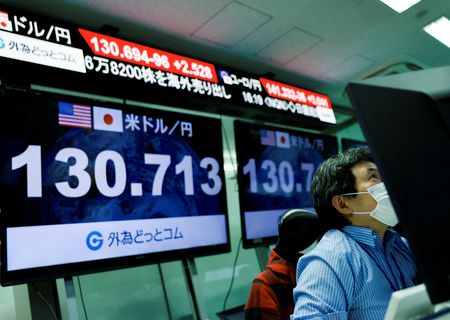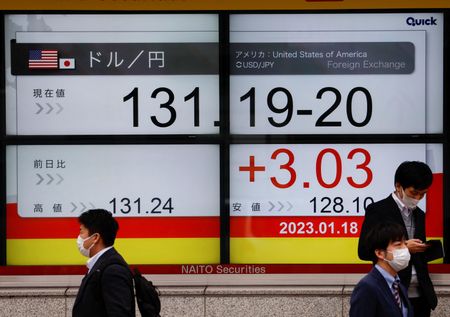By Jamie McGeever
(Reuters) – A look at the day ahead in Asian markets from Jamie McGeever.
No fireworks from the Bank of Japan but plenty damp squibs for investors to ruminate over, as a string of dismal U.S. economic indicators pours cold water on the ‘soft landing’ scenario that has gained traction lately.
Policy decisions from Indonesia and Malaysia – consensus forecasts point to 25 basis point increases from both – are the main set-piece events in Asia on Thursday, but the market mood on Wednesday was gloomy.
Retail sales, industrial production and producer price inflation on Wednesday all pointed to the world’s largest economy notably slowing in December. This follows recent figures showing recession-levels of manufacturing and services activity.
Finally, bad news may be bad news for risk assets. Bond yields slumped on Wednesday to multi-month lows, but rather than moving higher on expectations the Fed will slow up on its policy tightening, this time Wall Street slumped into the red.
Wall Street and world stocks had their worst day in two weeks. The Nasdaq, remarkably, snapped a seven-day winning streak – its best run since November 2021.
A range of yield curves in the United States and elsewhere shows investors are clearly anticipating economic slowdown, disinflation or outright recession. The inversion in the three-month/10-year U.S. yield curve is particularly staggering.
Graphic: Historic US yield curve inversion https://fingfx.thomsonreuters.com/gfx/mkt/jnpwywkajpw/us3us10.png
It’s a scenario at odds with the one of a global rebound led by China’s emergence from zero-COVID, Europe skirting recession thanks to unexpectedly mild weather and a strong labor market providing the U.S. economy with a soft landing.
International Monetary Fund Deputy Managing Director Gita Gopinath is certainly upbeat on China, telling Reuters on Wednesday that she expects a sharp recovery in economic growth from the second quarter onwards. Fourth quarter data from China was far stronger than feared.
On top of that, the BOJ’s surprise ‘no show’ on Wednesday – investors had expected a more hawkish decision – should be a boost for investor sentiment, at least until the next policy meeting rolls around.
But the tone across Asian markets on Thursday is likely to be bearish, given the way world markets went on Wednesday.
Three key developments that could provide more direction to markets on Thursday:
– Australia unemployment (December)
– Indonesia interest rate decision (forecast +25 bps)
– Malaysia interest rate decision (forecast +25 bps)
(Reporting by Jamie McGeever in Orlando, Fla.; Editing by Josie Kao)


